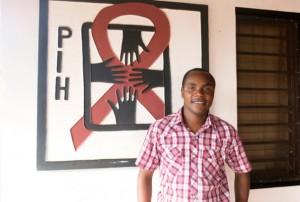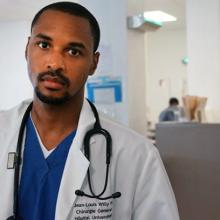
Courtesy of Inshuti Mu Buzima
I always wanted to become a nurse. As a child, I didn’t know the difference between nurses and doctors — all I knew is that the people in white coats had the power to help sick patients become healthy, and that is what I too wanted to do.
I finished nursing school and in 2007 I began working with PIH/IMB. Today, I am the manager for our noncommunicable diseases (NCD) program. This is an innovative project in which PIH/IMB and Rwanda’s Ministry of Health are designing and implementing care protocols for diseases such as hypertension, diabetes, and cancer in rural Rwanda.
With PIH/IMB, I am fortunate to be part of those contributing to policy formation and national planning for NCD care in Rwanda. The most rewarding part of my job is having the knowledge and ability to provide holistic care to those suffering, and especially to those suffering from NCDs.
When I’m not working on the big picture of NCD care in Rwanda, I love interacting with and listening to patients. Seeing our patients, especially the elderly and children, improve the quality of their lives gives me satisfaction. Nothing is better than seeing a patient smile after many years of critical sicknesses and hopelessness.
My biggest challenge as a nurse is working with limited resources. Patients living in extreme poverty are always very limited. It breaks my heart to see the devastating levels of poverty that many of our patients face, and it is difficult to provide enough comprehensive care to these vulnerable people.
At PIH/IMB, we have a program called Monitoring and Enhanced Supervision at Health Centers (MESH), which is very helpful. This new model focuses on improving the quality of nursing care and health centers through on-the-job mentorship. We aim to improve quality instead of simply inspecting quality.
Through this nurse-to-nurse mentorship, gaps in knowledge and ability are identified and filled in a sustainable way. I am involved in the MESH program for NCD nurses, which we have rolled out at both the health center and district hospital levels. With the NCD nurse mentors, we are establishing high-quality decentralized NCD care. This is a multi-faceted program and we think about all aspects of high-quality care, from data collection and quality, to protocol adherence for care providers and on-the-spot problem solving.
One of the most impactful experiences that I’ve had as a nurse is when I met a young diabetic patient—he was on the verge of dying at a very young age. He started to receive care at one of the PIH/IMB-supported hospitals, and was eventually transferred to another facility. I felt so drawn to him; I couldn’t see another patient die at a young age of a manageable disease. I decided to follow up with him closely, even when he was outside of the PIH/IMB catchment area. He eventually made a full recovery. Seeing this one life healthy and happy again was incredibly rewarding.
I love my job, and I love it most when I see people healthy and happy, knowing that I’ve played a role in their healing.
